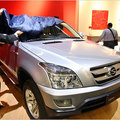Of all the early problems Bill Clinton faced as president, few stand out to Senator Hillary Rodham Clinton as more frustrating and avoidable than his rocky relationship with the military, her advisers say.
During his 1992 campaign, Mr. Clinton was attacked for avoiding the Vietnam draft and organizing antiwar marches in the 1960s. After taking office, his early focus on gay men and lesbians in the military drew sharp criticism from the chairman of the Joint Chiefs of Staff, Colin L. Powell, and other officers. Even his ability to salute properly was called into question.
Mrs. Clinton, to use a phrase, has been practicing her salute. As a senator and now as a presidential candidate, she has cultivated relationships with generals and admirals, prepped herself on wartime needs and strategy, and traveled to Iraq and Afghanistan.
“I think eight years in the White House, traveling the world and seeing the United States military doing the nation’s business, and now her time in the Senate, has given her a significant appreciation of the military that maybe her husband didn’t have before the White House,” said Jack Keane, the retired general and former Army vice chief of staff who has become close to the senator.
For Mrs. Clinton, exhibiting a command of military matters is not just about learning from her husband’s experience. It could be vital to her, as a woman seeking to become a wartime commander in chief, to show the public that she is comfortable with military policy and culture — and with the weight of responsibility that accompanies life-and-death decisions.
It is also part of an effort to shed the image some voters hold of her as an antimilitary liberal, defined by her opposition to the Vietnam War and, now, by her criticism of the Bush administration’s conduct of the war in Iraq.
A Time magazine poll in July asked adults to assess whether Mrs. Clinton would keep the military strong. Asked how much that description fit Mrs. Clinton, 33 percent said a lot, 25 percent said a little, 15 percent said not much, 18 percent said not at all and 10 percent had no answer.
Some uniformed officers, too, said that the Clintons were more associated with a ’60s culture than a military one, and that only time would tell if Mrs. Clinton’s appreciation of the military would go beyond niceties and expressions of concern.
Donald L. Kerrick, a retired general and former deputy national security adviser to President Clinton, acknowledged that some people inside and outside the military were skeptical of Mrs. Clinton’s intentions and wary that she would shift federal dollars to domestic programs like health care.
General Kerrick, who is close to Mrs. Clinton, said he believed that her appreciation of the military was genuine, but that it would take time and effort for that to come across.
“If, as president, she treats commanders and troops the same way she does now, she will quickly gain their support and respect,” General Kerrick said. “Military people are very loyal to the chain of command, and to people who understand them.”
In the Senate, Mrs. Clinton has supported expanding medical benefits for National Guard members and reservists and providing aid to those with traumatic brain injury and post-traumatic stress disorder. She has also defied liberals in her own party at times, endorsing the expansion of the Army, supporting financing for missile defense, and refusing to support a total ban on land mines.
But just as she has encountered some hostility from the left for not being a critic of the Iraq war earlier and for not renouncing her vote in 2002 to authorize it, Mrs. Clinton could also risk coming off as too hawkish to some Democratic voters for her vociferous support of military initiatives.
Some on the left ask if she is engaging again in the Clinton strategy of political triangulation: reaching out to military leaders while also trying to appease the left with her criticism of the war in Iraq. During her Senate re-election race last year, some liberals criticized her as currying favor with pro-military conservatives and independents by fiercely supporting Israel and taking a tough line against Al Qaeda and Iranian operatives in Iraq, similar to what her husband did during his presidency on social issues like welfare.
“Some days she sounds like a total hawk, and other days she’s saying, ‘I’m against the war and it’s been mismanaged,’ ” said Jonathan Tasini, who ran against Mrs. Clinton for the Senate Democratic nomination last year on an antiwar platform.
“But I don’t see how this helps her in the primaries,” Mr. Tasini continued. “So many people have turned against the war.”
Of the other main Democratic presidential candidates, only Senator Christopher J. Dodd of Connecticut has served in the military, as an Army reservist. Like Mrs. Clinton, most of the candidates rely on their service on Senate committees for their foreign policy credentials. Senator Barack Obama of Illinois serves on the Foreign Relations and Veterans Affairs Committees; former Senator John Edwards of North Carolina served on the intelligence committee; Senator Joseph R. Biden Jr. of Delaware is chairman of the Foreign Relations Committee; Mr. Dodd is a member of that committee.
Essential to Mrs. Clinton’s courtship of the military was winning a seat in 2002 on the Senate Armed Services Committee, which she had vigorously sought. In that role, she regularly meets with military officers, has traveled three times to Iraq and has attended hearings on global conflicts and the needs of the armed services.
Privately, two current military leaders who have testified before the Armed Services committee, and who by custom do not comment publicly on political figures, said they both found Mrs. Clinton conversant about the military and thoughtful in her questions.
Active-duty generals have sought her out, and she has reached out to them. Among those with whom she has built relationships are Gen. David H. Petraeus, the top commander in Iraq, and Adm. William J. Fallon, the new head of Central Command. Recently, too, James T. Conway, the commandant of the Marines, invited her to be his guest of honor at the “Sunset Parade” at the Marine Corps War Memorial in Washington, a high-profile tradition. (She has accepted.)
Some military analysts said that building ties with generals was only part of building a leadership image on military issues. Ted Galen Carpenter, vice president for defense and foreign policy studies at the Cato Institute, the libertarian research group, said Mrs. Clinton’s political shift to opposing the war in Iraq — combined with some voters’ skepticism about the Clintons and the military — posed a challenge for her, especially when she needs to prove that a woman is tough enough to be commander in chief.
“By surrounding herself with military brass, it reinforces an image of her as strong and hawkish,” Mr. Carpenter said. “But is that an authentic image? Would she really give dollars to the Pentagon instead of to cherished domestic programs?”
The Republican National Committee’s research staff members have already compiled a series of examples that they say show Mrs. Clinton at odds with military interests, including her Iraq war positioning and her opposition to sending additional troops there.
General Keane — whose support for sending more troops to Iraq is at odds with Mrs. Clinton’s view — and other admirers of hers see these skeptical or critical portrayals of her as playing into false stereotypes. He recalled how his own initial impression of her changed after their first meeting: It was supposed to last 15 minutes, but continued for a half hour longer as they talked about West Point and moved onto global hot spots.
John Batiste, a retired major general and former commander of the First Infantry Division, who also consults with Mrs. Clinton, said, “Very, very few politicians have any military experience, and they’re naïve — they don’t understand what it takes to develop a big picture, unified strategy to take a country to war.
“She’s the kind of person who would listen to sound military advice,” General Batiste said, “and not dismiss it or discard it. And I’m a lifelong Republican.“





